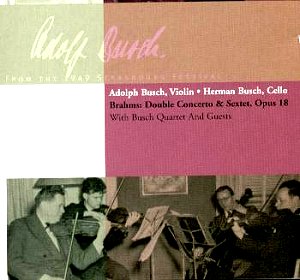It was fortunate that the Strasbourg Festival of 1949
attracted the attention of some recording apparatus. These performances
were recorded on lacquer discs and the technical reconstruction has
been undertaken by Maggi Payne. The Double Concerto emerges dimly but
in still perfectly listenable sound but the Sextet is very much more
problematical; I doubt if anyone could extract better sound than Payne
has managed and we should be grateful that these performances have survived
at all, filling gaps in Busch’s discography as they do.
Relatively plentiful now, there was a time when the
only recording one could buy of the Double Concerto was the Thibaud-Casals-Cortot
set recorded in Barcelona. Others appeared in the two decades that followed
– Heifetz-Feuermann-Ormandy (incandescent), Kulenkampff–Mainardi-Schuricht,
and Oistrakh-Sadlo-Ancerl but Adolf Busch, noted Brahmsian though he
was, never recorded it commercially. Which was not perhaps surprising
given the existence of the Heifetz-Feuermann. That deficiency has been
righted here in a performance that takes a far more measured and considered
view of the score than their Russian contemporaries, though one slightly
quicker than, say, the familiar Oistrakh-Fournier-Galliera recording.
The relative dimness of the aural perspective makes
for occasional imprecision in the orchestral sound, added to which Hermann
Busch, fine chamber player though he was, was not a soloist and for
all the phrasal sensitivity and interplay with his brother the gruffness
of his playing and the frequent lack of centring of the note can and
does prove problematical. I admired the elucidatory and revelatory phrasing
by both brothers at 9.30 – great nobility and elevation of phrasing
with the seamless limpidity of their exchanges - and the absence (expected
of course) of gladiatorial theatrics, such as does sometimes limit the
Heifetz-Feuermann recording. The principal clarinet of the French National
Radio Orchestra is also in fine form and proves a player of distinction.
In the slow movement there is great raptness of phrasing though arguably
it is too predictably effected through increases in vibrato usage and
bow pressure. There are however pleasures in the unusual angularity
of the cello line and the ways in which Hermann Busch cleverly varies
phrases and employs his still gruff but now keening lower strings. They
keep things moving but still have plenty of time for lyrical introspection
(they are slightly quicker than Oistrakh-Fournier but much slower than
the galvanic Heifetz-Feuermann (8.03 against the Russians’ 6.47). There
is real lightness in the finale – this is the best played and interpreted
of the three movements – with some almost gnomic exchanges between the
string players and much scurrying, flighted passagework. Kletzki abets
this with a really felicitous care and energy.
The Sextet, as I indicated, is in rather poor sound,
muffled and very much to be taken on trust, the first movement especially.
We can still make out much though, with Albert Bertschmann (viola) and
August Wenzinger (cello) joining the Busch Quartet. Wenzinger will be
better remembered for his popular viol consort. There is flexibility
in the opening movement and a dignified and affectionate cohesion to
the famous Andante that lifts it beyond the static and sepulchral performances
one sometimes hears. The Scherzo is fantastically fleet, a headlong
dash phrased with insinuating and life enhancing lightness. The Rondo
finale suffers increasing aural problems – break ups and distortion
but is taken at a gracious and elegantly flowing tempo. There’s an encore
– all announced by the way – of the Mendelssohn Capriccio, which is
full of winsome clarity and soaring verve.
Jonathan Woolf
